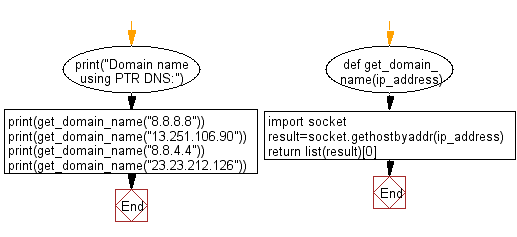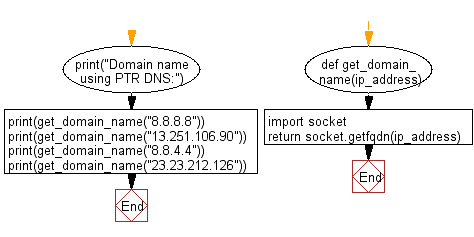Python: Get the domain name using PTR DNS records from a given IP address
PTR DNS Domain Name
Write a Python program to get the domain name using PTR DNS records from a given IP address.
What is a DNS PTR record?
The Domain Name System, or DNS, correlates domain names with IP addresses. A DNS pointer record (PTR for short) provides the domain name associated with an IP address. A DNS PTR record is exactly the opposite of the 'A' record, which provides the IP address associated with a domain name.
DNS PTR records are used in reverse DNS lookups. When a user attempts to reach a domain name in their browser, a DNS lookup occurs, matching the domain name to the IP address. A reverse DNS lookup is the opposite of this process: it is a query that starts with the IP address and looks up the domain name. Source: cloudflare.com
Sample Solution-1:
Python Code:
# Define a function 'get_domain_name' that takes an IP address as an argument.
def get_domain_name(ip_address):
# Import the 'socket' module to perform DNS queries.
import socket
# Use 'socket.gethostbyaddr' to get the domain name associated with the given IP address.
result = socket.gethostbyaddr(ip_address)
# Convert the result to a list and return the first element, which is the domain name.
return list(result)[0]
# Display a message indicating the next section.
print("Domain name using PTR DNS:")
# Call the 'get_domain_name' function with different IP addresses and print the results.
print(get_domain_name("8.8.8.8"))
print(get_domain_name("13.251.106.90"))
print(get_domain_name("8.8.4.4"))
print(get_domain_name("23.23.212.126"))
Sample Output:
Domain name using PTR DNS: dns.google ec2-13-251-106-90.ap-southeast-1.compute.amazonaws.com dns.google ec2-23-23-212-126.compute-1.amazonaws.com
Explanation:
Here is a breakdown of the above Python code:
- get_domain_name Function:
- Defines a function "get_domain_name()" that takes an IP address as an argument.
- Importing the 'socket' Module:
- Imports the "socket" module to perform DNS queries.
- Performing DNS Query:
- Uses socket.gethostbyaddr to get the domain name associated with the given IP address.
- Returning the Domain Name:
- Converts the result to a list and returns the first element, which is the domain name.
- Calling the Function:
- Calls the "get_domain_name()" function with different IP addresses and prints the results.
Flowchart:

Sample Solution-2:
Python Code:
# Define a function 'get_domain_name' that takes an IP address as an argument.
def get_domain_name(ip_address):
# Import the 'socket' module to perform DNS queries.
import socket
# Use 'socket.getfqdn' to get the fully qualified domain name associated with the given IP address.
return socket.getfqdn(ip_address)
# Display a message indicating the next section.
print("Domain name using PTR DNS:")
# Call the 'get_domain_name' function with different IP addresses and print the results.
print(get_domain_name("8.8.8.8"))
print(get_domain_name("13.251.106.90"))
print(get_domain_name("8.8.4.4"))
print(get_domain_name("23.23.212.126"))
Sample Output:
Domain name using PTR DNS: dns.google ec2-13-251-106-90.ap-southeast-1.compute.amazonaws.com dns.google ec2-23-23-212-126.compute-1.amazonaws.com
Explanation:
Here is a breakdown of the above Python code:
- get_domain_name Function:
- Define a function "get_domain_name()" that takes an IP address as an argument.
- Importing the 'socket' module:
- Import the "socket" module to perform DNS queries.
- Performing DNS query:
- Use socket.getfqdn to get the fully qualified domain name associated with the given IP address.
- Return the domain name:
- Returns the fully qualified domain name obtained from the DNS query.
- Call the function:
- Calls the "get_domain_name()" function with different IP addresses and prints the results.
Flowchart:

For more Practice: Solve these Related Problems:
- Write a Python program to perform a reverse DNS lookup for a given IP address and return the associated domain name.
- Write a Python program to query PTR DNS records for an IP address using a DNS library and display the result.
- Write a Python program to retrieve the domain name from an IP address by performing a reverse DNS lookup with socket.gethostbyaddr().
- Write a Python program to get the PTR record for an IP address and output the corresponding domain name.
Go to:
Previous: Write a Python program to convert all items in a given list to float values.
Next: Write a Python program to check if every consecutive sequence of zeroes is followed by a consecutive sequence of ones of same length in a given string. Return True/False.
Python Code Editor:
Have another way to solve this solution? Contribute your code (and comments) through Disqus.
What is the difficulty level of this exercise?
Test your Programming skills with w3resource's quiz.
